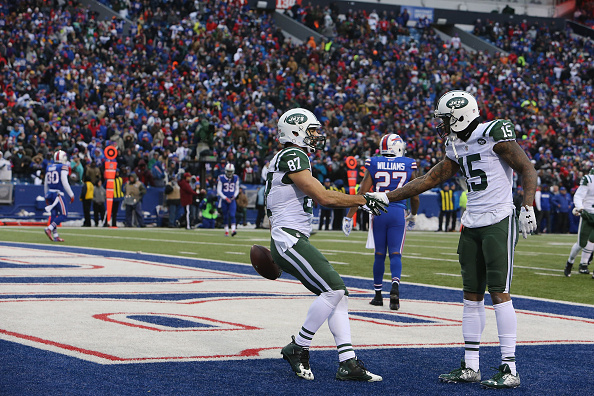.jpeg) Stacking is a term, most closely associated with DFS, referring to playing three or more players from the same team. Stacking has a similar meaning in seasonal leagues, but the strategy involved can be quite different. By examining those differences, we can determine the best way to stack for both DFS and seasonal football contests.
Stacking is a term, most closely associated with DFS, referring to playing three or more players from the same team. Stacking has a similar meaning in seasonal leagues, but the strategy involved can be quite different. By examining those differences, we can determine the best way to stack for both DFS and seasonal football contests.
The strategy behind stacking in DFS is pretty simple. If you find a favorable matchup for a high-scoring game, you want to take full advantage. If playing one right-handed batter facing Jorge de la Rosa is good, playing three or four is probably better. The idea is similar in fantasy football, but not quite as effective.
One of the nice things about stacking in baseball is you know each player will have roughly the same chance of taking advantage of the favorable starting pitcher/ballpark/bullpen. The leadoff batter may get an extra at-bat, and a platoon player may get lifted for a pinch hitter, but in general, every player will get every ninth plate appearance. If football (and basketball) there are only so many offensive possessions to go around. Every handoff to Jeremy Hill means one less passing attempt for Andy Dalton.
For this reason, not every stack is created equal, and how you stack should probably be different in a GPP than a cash game.
In a GPP, the most effective stacks often involve a quarterback and two or three receivers. You want to maximize upside, so you are hoping most of that team’s offensive touchdowns come through the air, and that you can identify the receivers those targets go to. Including a running back in a stack can be effective, but it lowers your ceiling, since each rushing touchdown only benefits the runner.
The main problem with stacking for DFS, no matter the format, is even if the team you pick does get it rolling on offense, it is hard to know where the scoring will come from. Maybe this is the week John Kuhn gets a random touchdown, Jay Cutler suddenly looks for the second or third-string tight end in the red zone. I’m sure there were a lot of Patriots stacks in Week 3 of last season, when New England scored 51 against Jacksonville. The only problem: Tom Brady only threw two touchdowns, and neither went to Rob Gronkowski or Julian Edelman. Also, after two huge weeks, Dion Lewis took a back seat to LeGarrette Blount. Even if you had New England scoring 51 that week, it would have been difficult to turn that into a huge fantasy day.
.jpeg) When I stack, I prefer offenses that only have a couple of options. Last season the Jets had 33 passing touchdowns, and 26 of them went to Brandon Marshall and Eric Decker. By contrast, the Cardinals had 33 passing touchdowns, but Larry Fitzgerald and John Brown only combined for 16. Michael Floyd had another six and David Johnson added four. Even if you thought Carson Palmer would have a big day throwing, you might have a hard time figuring out which receivers would benefit most.
When I stack, I prefer offenses that only have a couple of options. Last season the Jets had 33 passing touchdowns, and 26 of them went to Brandon Marshall and Eric Decker. By contrast, the Cardinals had 33 passing touchdowns, but Larry Fitzgerald and John Brown only combined for 16. Michael Floyd had another six and David Johnson added four. Even if you thought Carson Palmer would have a big day throwing, you might have a hard time figuring out which receivers would benefit most.
My philosophy on stacking in seasonal formats is simple: I don’t seek it out, but I don’t avoid it, either. If Dez Bryant is the top receiver on my draft board, I’m not going to pass on him because I took Ezekiel Eliott in the first round, and I will still be happy to take Tony Romo if he falls past the 10th round.
The argument against stacking in seasonal leagues is you are putting all of your eggs in one basket, and that can come back to bite you in any given week. If you have Ben Roethlisberger, Antonio Brown and Le’Veon Bell and the Steelers run into a hot defense or can’t move the ball because the weather is so bad, you will probably lose that week. Even the best offenses can lay an egg from time to time, but you have a chance to survive single-digit fantasy production from Ben Roethlisberger if you aren’t also starting two or three of his teammates.
That argument has some merit, which is why if I own Brandon Marshall and I have a tough decision between Eric Decker and Golden Tate, I might lean towards Tate. On the other hand, if Tate is already off the board, I’m not going to take somebody I have significantly lower in my rankings simply to avoid a stack. At the end of the day, I want the players who will score the most fantasy points. Besides, if Brandon Marshall goes down in Week 2, stacking is suddenly less of a concern. And if Brandon Marshall and Eric Decker are good again, as I suspect they will be, I can always trade one or both of them. I am willing to accept a bit more risk to get the best players available on my draft board.

